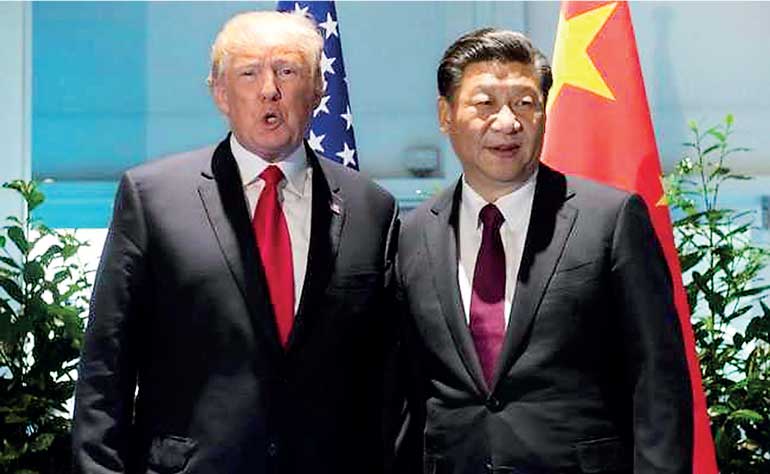Tuesday Feb 24, 2026
Tuesday Feb 24, 2026
Monday, 12 March 2018 00:00 - - {{hitsCtrl.values.hits}}

US President Donald Trump with Chinese President Xi Jinping
BEIJING (Reuters): Any trade war with the United States will only bring disaster to the world economy, Chinese Commerce Minister Zhong Shan said on Sunday, as Beijing stepped up its criticism on proposed metals tariffs by Washington amid fears it could shatter global growth
After pressure from allies, the United States has opened the way for more exemptions from tariffs of 25 percent on steel imports and 10 percent on aluminium that US President Donald Trump set last week.
On Saturday, the European Union and Japan urged the United States to grant them exemptions from metal import tariffs, with Tokyo calling for “calm-headed behaviour.”
But the target of Trump’s ire is China, whose capacity expansions have helped add to global surpluses of steel. China has repeatedly vowed to defend its “legitimate rights and interests” if targeted by US trade actions.
Zhong, speaking on the sidelines of China’s annual session of parliament, said China does not want a trade war and will not initiate one.
“There are no winners in a trade war,” Zhong said. “It will only bring disaster to China and the United States and the world.”
China can handle any challenges and will resolutely protect its interests, but the two countries will continue to talk, he said.
“Nobody wants to fight a trade war, and everyone knows fighting one harms others and does not benefit oneself.”
Trump’s announcement on tariffs underlined concerns about rising US protectionism, which has sparked bouts of turmoil in global financial markets over the past year as investors feared a damaging trade spat will shatter a synchronized uptick in world growth.
China’s metals industry issued the country’s most explicit threat yet in the row, urging on Friday for the government to retaliate by targeting US coal – a sector that is central to Trump’s political base and his election pledge to restore American industries and blue-collar jobs. The US is the world’s biggest importer of steel, purchasing 35 million tonnes of raw material in 2017. Of those imports, South Korea, Japan, China and India accounted for 6.6 million tonnes.
Trade tensions between China and United States have risen since Trump took office. China accounts for only a small fraction of US steel imports, but its massive industrial expansion has helped create a global glut of steel that has driven down prices.
The dispute has fuelled concerns that soybeans, the United States’ most valuable export to the world’s second largest economy, might be caught up in the trade actions after Beijing launched a probe into imports of US sorghum, a grain used in animal feed and liquor.
Protecting American jobs
Zhong said US official trade deficit figures had been over-estimated by about 20 percent, and in any case would be a lot lower if the United States relaxed export restrictions on some high-tech goods.
He also reiterated a previous pledge that China would lower import tariffs on consumer goods including automobiles, as part of an effort to boost domestic consumption.
Trump believes the tariffs will safeguard American jobs, though many economists say the impact of price increases for users of steel and aluminium, such as the auto and oil industries, will destroy more jobs than curbs on imports create.
Nonetheless, there is growing bipartisan consensus in Washington, and support within some segments of the US business community, for the US government to counter what are seen as Beijing’s predatory industrial policies and market restrictions on foreign firms.
Trump’s administration has said the United States mistakenly supported China’s membership in the World Trade Organization in 2001 on terms that have failed to force Beijing to open its economy.
Diplomatic and US business sources say the United States has frozen a formal mechanism for talks on commercial disputes with China because it is not satisfied Beijing has met its promises to ease market restrictions.
Berlin (Reuters): A trade war between Europe and the United States can still be averted, German Economy Minister Brigitte Zypries said on Saturday (10 March), adding she hoped that talks in Brussels this weekend could help to prevent an escalation.
U.S. President Donald Trump set import tariffs on 8 March of 25% on steel and 10% on aluminium but is under heavy pressure from allies including the European Union and Japan to dilute the measures.
U.S. Trade Representative Robert Lighthizer was due to meet EU trade chief Cecilia Malmstrom and separately with Japanese Trade Minister Hiroshige Seko on Saturday for long-planned talks that have taken on added urgency amid concerns that Trump’s move could provoke a global trade war.
Zypries told Deutschlandfunk radio that so far no tariffs had been imposed and it was too early to talk about a looming trade war. “But we’ve reached a situation in which the preliminary skirmishes have become serious,” she added.
Zypries said the EU’s Malmstrom was trying to solve the dispute through negotiations, adding: “There are still talks going on, things are in flux, so if you want you could say it’s still about diplomacy and not war.”
The minister said Trump’s proposed tariffs would violate the rules of the World Trade Organisation (WTO) and that Germany would coordinate closely with the European Commission on how to react if Trump pushed ahead.
“Of course, we would have to take proceedings against him at the WTO,” Zypries said. “And in addition, we will have to think about counter-measures.”